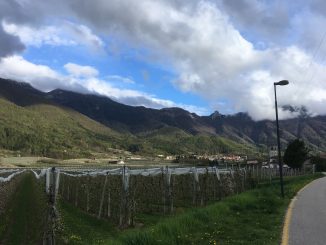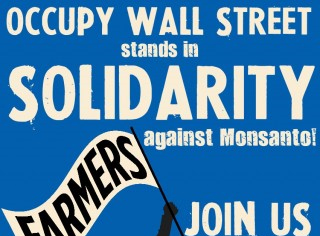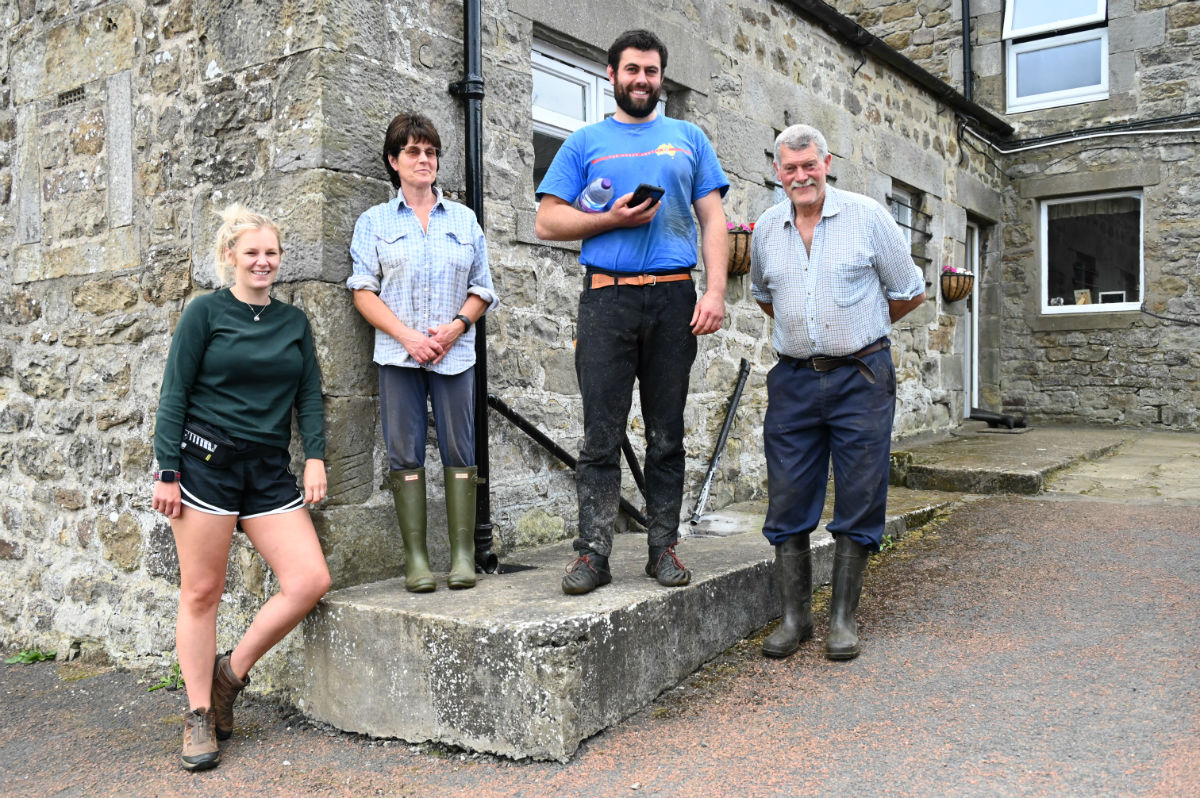
Marianne Landzettel returns with the second article recounting her visit to Northumberland, England, where she discovered how four farm families are dealing with post-Brexit agri policy. Part 1 left off at the Walton’s farm, which faces a £50,000 loss of farm income as basic payments are phased out. In Part 2, we meet the Robson family, Graham Moore, and David and Annabel Stanners. These farmers are using different strategies to respond to the loss of basic payments and uncertainty around replacement schemes, but the gravity of the situation is clear. The story ends with a consideration of the mental health impacts that the policy shifts and calls to diversify may have on farmers in the region.
Graham Robson: working more and harder
It doesn’t take long to get from the Waltons to the Robsons, the two families are neighbours. The once cobbled farm yard is enclosed on three sides by ancient stone barns and storage rooms, on the fourth side is the farm house and the entrance to the yard.
The farmhouse has been modernised, but the rest of the farm apparently has not changed much since it was built in the 18th century, and one building, a fortified structure with steep stairs leading up to the top floor dates back to the 16th century. The farm is beautifully situated and with its old stone buildings and nearby grazing animals it could feature on any postcard or tourist board brochure.
Graham Robson’s great-grandfather got the farm tenancy in 1955, but the Robsons have been farming in Northumberland for many generations prior to that.
The farm has 500 acres, 75 of which are suitable for making silage. There are 60 suckler cows and a Limousin cross bull. The Robsons buy in dairy heifers in calf or with a small calf, but “it takes four to five years till you make any money on them, provided you don’t lose a calf”, says Graham Robson’s dad, also called Graham.
Ideally, they would like to overwinter all the cattle in a barn, but even though they have invested in a new barn and machine shed next to the road, there is not enough space. Some of the animals have to stay on pasture but require additional feed.
The 400 breeding ewes are hardy northern Blackface, they have impressive horns – and a temper. The Robson’s sheep are hefted which means they don’t need to be fenced. They move freely across what they know to be ‘their’ pastures, a knowledge the ewes pass on to their lambs.
For tupping*, Robson brings in Leicester rams. The female lambs are sold for breeding on lowland farms where they do well, they are hardy and fend for themselves. The males are sold for meat.
Graham Robson’s parents still work full time on the farm which leaves him time to do contract work on other farms. His wife Lindsey works full time at Unison Colour in Hexham, a producer of handmade soft pastels. Right now, Lindsey is on maternity leave.
On the day of our visit, the Robsons are shearing sheep. Graham Robson’s dad is waiting for a hip replacement and is restricted in his movements, but he still manages to manoeuvre the next candidate for shearing from the holding pen to the open barn where his son grabs the sheep by the horns and, with a few fluid wrestling moves, secures it between his legs, belly facing up.
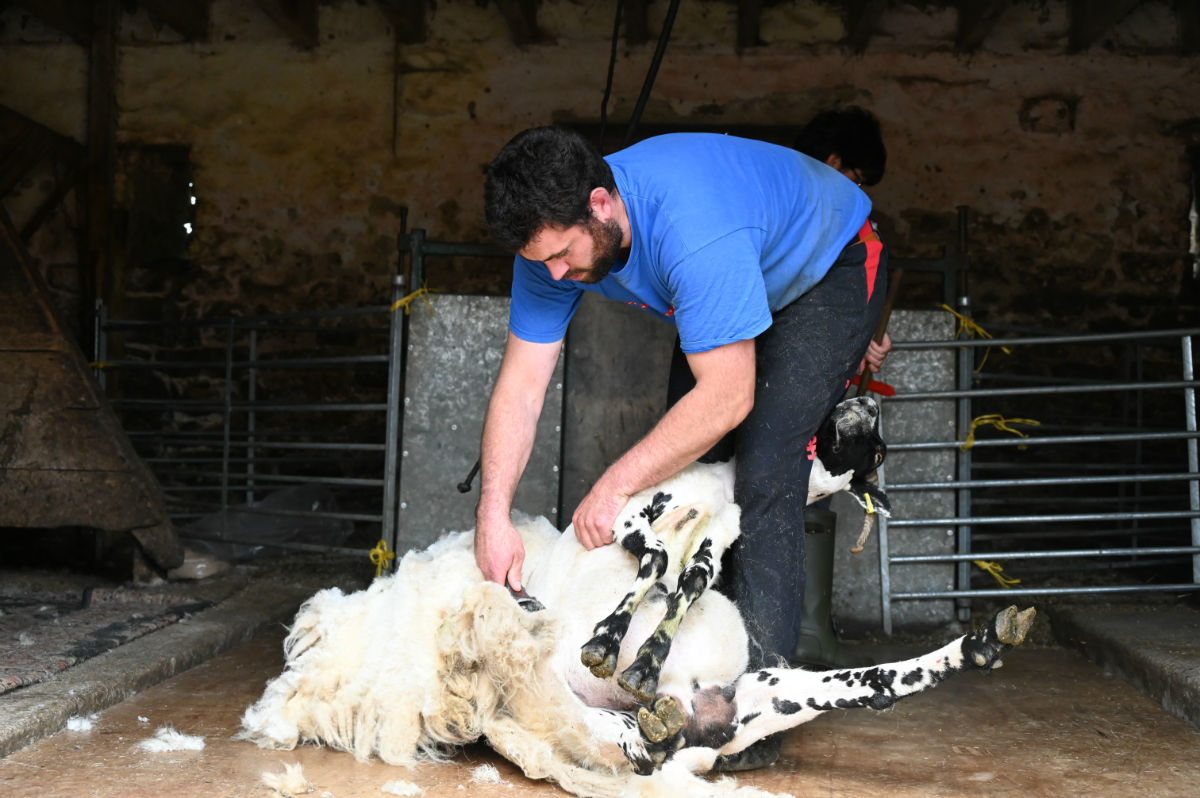
It only takes him a few minutes to take off the fleece with well-practiced movements and without nicking the skin. While his father brings in the next sheep, his mother gathers the fleece, carries it next door and stuffs it carefully in one of the wool bags supplied by British Wool. Except for the wool from the few Leicesters which pays five times what it costs to shear, the wool is worthless.
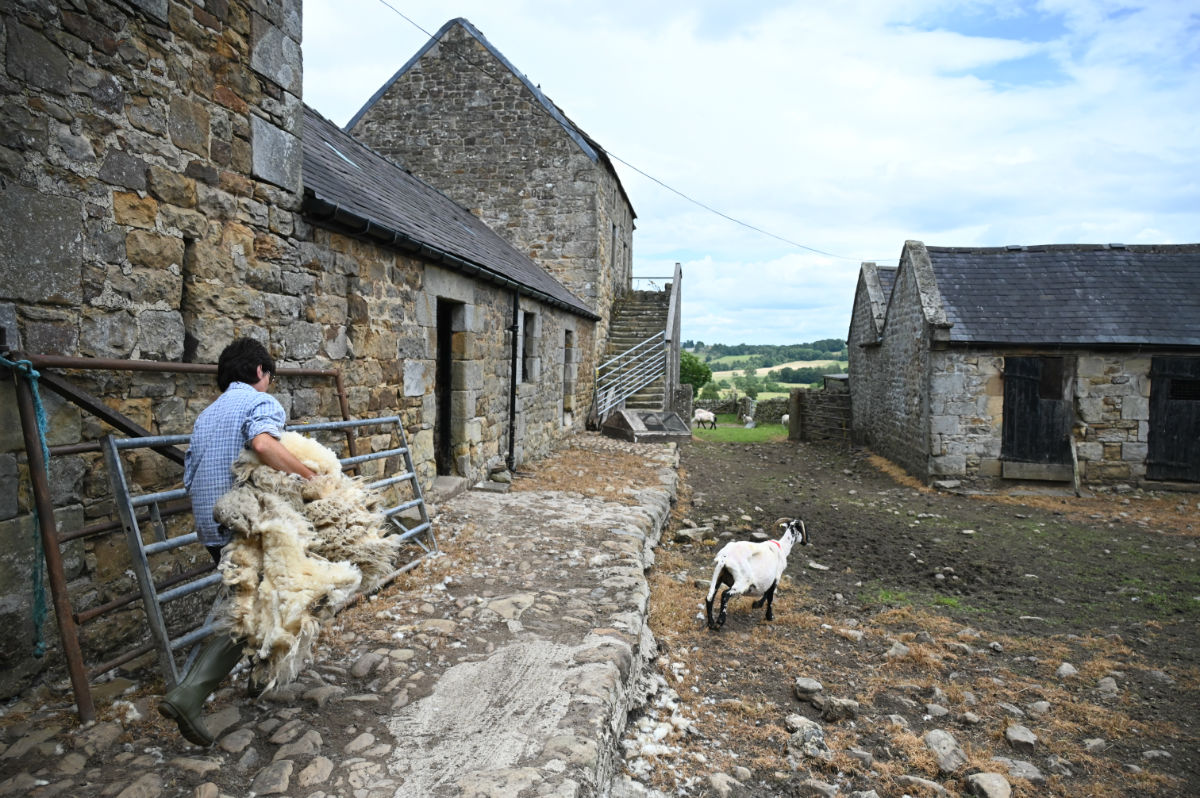
Graham Robson, who is now 30, learnt shearing at the age of 16. “It really takes years until you are good at it”, he says. He always liked physical work, handling livestock and being outside. The school he attended until he was 18 had a farm on the premises and Robson was able to graduate with three agriculture related A levels. Through the ‘Young Farmers’ youth organisation he got a scholarship and spent nine months working on farms on New Zealand’s North Island. Since his return he’s been working with his parents.
Up to now the Robsons have not signed up for any stewardship schemes because of the management restrictions that would apply. They recently hired a consultant to help them work out which SFI schemes might provide an extra income without having to change practices on the farm too much. The ‘low input grassland’ scheme, and ‘providing habitat for ground nesting birds’ might be options. The consultant believes that, all going well, the payments for those two schemes could make up for two thirds of the Basic Payment Scheme (BPS) money. For the consultation and filing the applications the adviser charged £1,200. Whether the Robsons will get into the schemes and how much they will eventually be paid remains to be seen.
One third of the farm’s income comes from the contract work Robson does on other farms, such as shearing sheep. To make up for the BPS shortfall he hopes to increase the hours he can work on other farms. He may also have to reduce stock numbers to save on feed, straw and fertiliser. The plan hinges on his parents continuing to work on the farm full-time. The old barns and storage spaces may look pretty, but they are labour intensive and therefore not really fit for purpose.
What happens when the older Robsons retire or have to work less? While we talk, Graham Robson continues shearing. He is young, an extremely capable, fit, strong, fast and focused worker. It’s so obvious that farming – this farm – is his life and he will do all he can to hold on to it and provide for his family. If George Orwell were alive, he could write a new version of Animal Farm; for farmers like Graham Robson the motto already is: I’ll work harder.
Nigel Moore and the SFI roulette
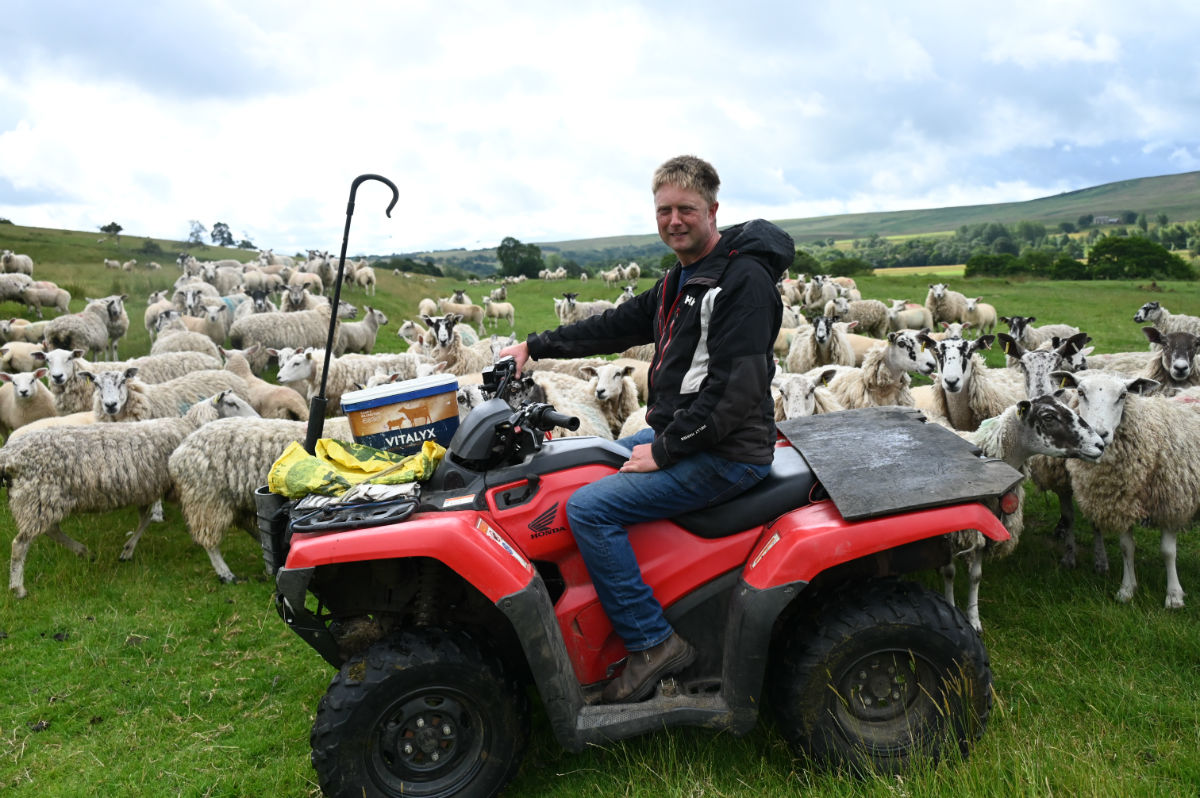
We continue west on the small country lane, through Bellingham, across another ridge and reach Nigel Moore’s farm.
Moore farms 800 acres, half of them are his, the other 400 acres are rented from two different landlords. Roughly 140 acres are suitable for making silage. “I’m farming four types of land”, says Moore “fertile acres here in the valley, good pastures, medium pastures and rough land with a lot of bracken and rocks”.
He has 1,000 sheep, a mix of Aberfield, Abermax, Swaledale and Blue Face Leicester and, like Michael Walton, he sells fat lambs to a wholesaler. Even though the higher value wool is separated out, overall, the price he gets for the wool of his herd does not cover the cost of shearing.
Moore takes us to see some of the cattle, a beautiful mix of Limousin, Angus, black Hereford and Simmentals, watched over by a Belgian Blue Limousin cross bull with a muscle definition that would have him win any bodybuilding championship. Moore sells the calves at 12 to 14 months. 25 of the 80 suckler cows calve in autumn, which means the calves can be sold in January and February, which really helps the farm’s cash flow.
There is no area of farming where Moore is not trying to save costs and optimise the workflow. On his silage acres he is testing herbal leys which do not need to be fertilised. That’s a plus, but the leys have to be reseeded every four to five years while grass mixes last six to ten years. And whether the silage made from the leys is as nutritious as the grass silage will only become apparent this winter. If he has to buy in more feed, the savings he made on fertilisers may be cancelled out.
Nigel Moore did a three-year degree at Kirkley Hall agricultural college. He then worked for a year on the farm where he’d been an intern during his training before returning home. His uncle, who owned the neighbouring farm had died of cancer and shortly after that Moore’s father, too, had been diagnosed with cancer and needed help. Since he passed away 12 years ago, Moore has been managing the farm on his own.
When he took over, much of the farm infrastructure was old. The feed was stored in old barns and had to be manually filled into sacks before it could be distributed to the cattle. And the wooden holding pens and crush in the farm yard were dangerous, animals often jumped the barriers and ran straight onto the road. A decision had to be made: hire staff or invest in infrastructure.
In 2018, Moore had a new barn built at a cost of roughly £100,000. And he invested in a cattle chute with a curved working alley: the head and back of the animal can be held in place, a chute gate allows for three animals to be kept waiting.
Moore can now safely do much of the work, such as administer boluses**, by himself, but the new set-up came at a price: £4,000 for the chute and £20-30,000 for laying the concrete foundation and the coral.
On the day of our visit, two feed silos are being installed. The autumn calving cows and the spring calves have to be housed over winter. Feeding them will now be a lot easier, Moore will no longer need help for this task either.
What does the financial future of his business look like? Basic payments accounted for 50 to 60% of farm income, says Moore. Much of the land has been in the Higher Countryside Stewardship programme for two decades.
He used the government’s offer to get a free consultation from an agronomist. The advice was to enter additional land into a higher tier SFI scheme. But that would come with restrictions: he would have to keep a 70/30 ratio of cattle to sheep on the pastures. He might be paid £10,000 through SFI, but would have to take 200 sheep off the pastures and introduce more cattle.
It’s almost impossible to figure out whether the changes would result in a net financial gain and be worth doing. “You are forced to make choices, but you don’t know what the impact will be”, says Moore. There is no knowing whether feed and fertiliser costs will go up again and what the margins on beef and lambs will be next year. Yet decisions have to be made, farmers either sign up for a scheme or they don’t. That’s the point where SFI becomes more like a game of roulette than a viable source of farm income for delivering public goods.***
Talking to Moore, the tension and the stress he is under are palpable. Two things are certain: once BPS ends, he will still have service the bank loans and pay rent to the landlords. So, what are the options? Eventually he may have to speak to the landlords about a rent reduction, says Moore. And his wife’s off-farm income will no longer pay for extras, but will become a vital part of the family income.
David and Annabel Stanners
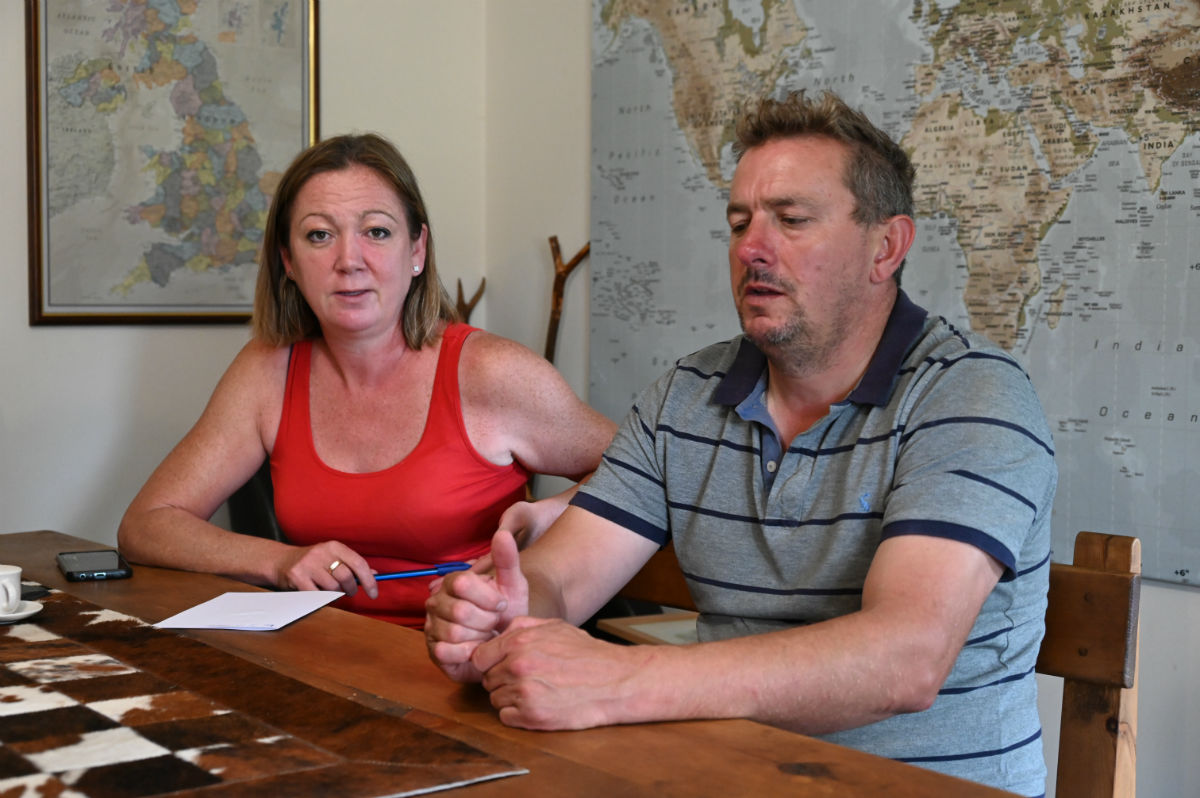
We make our way back to Risdale and the farm of the Stanners family. Unlike the farmers we have visited so far, David and Annabel are first generation farmers and neither comes from a farming family.
Annabel grew up on a council estate in Hexham, David was born on the outskirts of Newcastle. From an early age he loved being in the countryside and spending time with his grandma in the Cheviots. Like Nigel Moore, he attended Kirkley Hall Agricultural College where he also met Annabel who was training to be a farm secretary. He was offered a job at the farm where he had done his practical training. He enjoyed working with livestock, but as farm subsidy rules changed, the business model of the farm wasn’t working anymore and Stanners decided to strike out on his own. In 2004, he became livestock manager on Lord Darby’s Knowsley Estate on the outskirts of Liverpool.
Should you ever find yourself fighting for survival as a contestant on a reality TV show, Annabel Stanners is the kind of woman you definitely want to have on your team. Not yet married to David, she gave up her job as an insurance broker in Newcastle where she had been on a clear career path and decided to move with him to Liverpool. “We left with a hired van and furniture bought on credit”, she says.
While David managed Knowsley Estate, Annabel worked for the National Farmers’ Union Mutual Insurance Society until the couple had their second child. “I thought: what’s the point of having children if you just rush like mad to drop them off at the nursery every day?”
The Stanners always wanted to run their own farm, and in 2010 they began looking for a tenancy. The search took them from Cornwall in the southwest of England right up to Scotland, but competition for tenancies was fierce.
Then, in 2016, the tenancy in Risdale came up. “We went for an interview and when we were invited back I thought we had made the shortlist, but when the landlord showed us around the farmhouse and said the tenancy was ours if we wanted it, I just burst into tears”, says Annabel.
The farm has 600 acres, 100 of which are suitable for silage making. The 75 suckler cows are Luing**** cattle, a crossbreed of Beef Shorthorn with Highland cattle, hardy and with excellent meat quality.
The 600 ewes are mostly a three way cross of East Frisian, New Zealand Texel and Romney. There are also some traditional Northumberland Black Face. “I really don’t like working with them”, says Annabel Stanners, “their horns make them quite dangerous to handle and they won’t go up a mountain”.
Agri-tourism – the Stanners’ railway carriage refit
The area around Risdale is not directly on the tourist trail, visitors mostly head straight for the National Park or hike the Pennine Way. The landscape around the farm with its beautiful vistas across the valley towards the mountains has a serene tranquillity – perfect for a weekend retreat. Planning permission for holiday cottages is hard to get, but from the start, the Stanners had a different idea.
From 1862 to the middle of the 20th century, the Wansbeck Railway or ‘Wannie’ Line ran right through the farm – why not refit an old railway carriage as a holiday let? The landlord agreed to the plan, but it took the Stanners two years to find a suitable carriage. And that was just the beginning. Road access had to be built, the carriage had to be connected to the grid and water mains, a sewage tank had to be installed.
The railway carriage itself was redesigned and fitted with two French windows opening onto a porch. There are two bedrooms with en suite bathrooms on either end and a lounge area and kitchen in the middle. It cost the Stanners roughly £120,000 to build ‘Wannies Retreat’ but it was worth it. “It earns us more than the farm business”, says Stanners.
Could they invest in a second holiday let to make up for the loss of BPS payments? “Right now, it really is a retreat”, says Annabel, “a second carriage would spoil that. We would also need to hire someone to help with cleaning, but we wouldn’t get planning permission in any case”. Tourist accommodation can now only be built if there is ‘easy access to public transport’, a bus that stops once a week probably does not qualify. “It is funny, the government in London asks farmers to diversify and go into tourism – and then local government prevents you from doing so”.
The Stanners have a very clear-eyed view of the farm’s financial situation. Before Brexit the BPS payment was £56,000, another £11,000 come from a Countryside Stewardship programme. If the whole farm were to be placed into a higher tier SFI scheme, they would likely receive £36,000 which would leave a financial hole of £30,000.
And because of the restrictions attached, the Stanners would face the same dilemma as Nigel Moore, having to weigh SFI payments against possible income losses because stocking numbers have to be reduced.
The free consultancy points only to one possible new income stream: upland woodland planting on pastures. The Stanners like the idea, but there is a risk that they will not be allowed to join the scheme. The pastures are a curlew nesting area and protected. Curlews are ground breeders and don’t like trees in the vicinity, which means it is up to Natural England, a nature conservation agency, to accept or deny entry into the programme.
If they get into the woodland pasture scheme and the land rent can be renegotiated the Stanners might just be ok. But what if they don’t get accepted. Both agree that a £30,000 loss of income would make the farming business unviable. “We would have to give the tenancy up”, says Stanners. Annabel would once again work in insurance, David, too, would find a job off farm. Somehow they would make a living.
Both have poured their heart and soul into the farm, farming is what they want to do, they chose a long, hard road to get where they are today, but the family and the children come first, even if it means walking away from farming in the future.
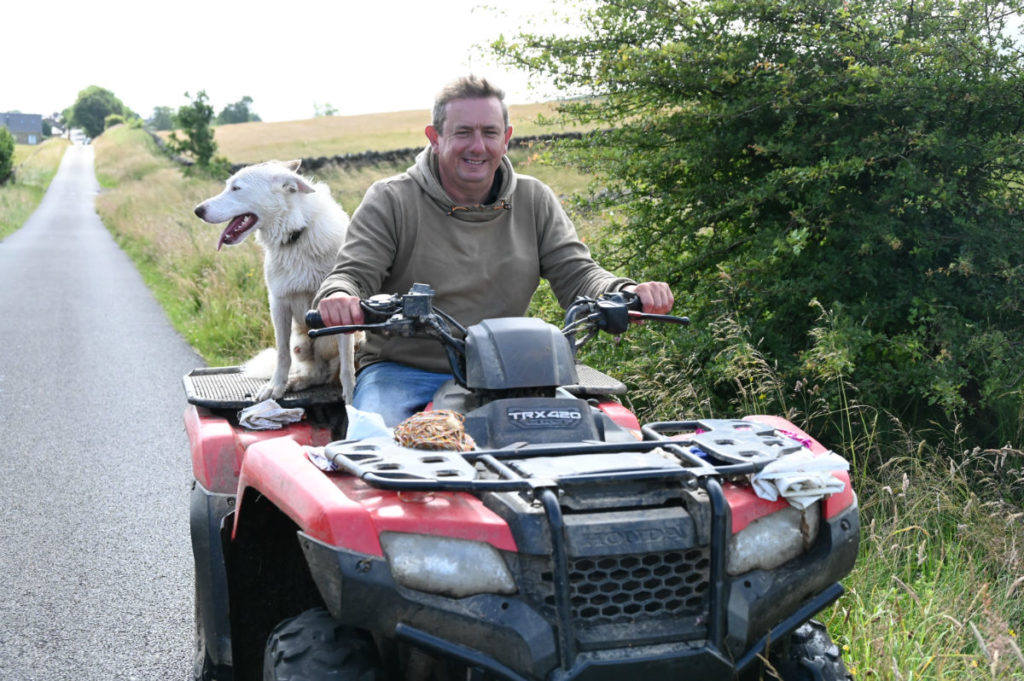
A mental health crisis in the making
As awful an option as leaving farming is for a farmer, and as heart breaking as it would be for the Stanners to have to take it, they have previously worked in different jobs and locations. With that experience comes some clarity. There is a plan B. And being a first generation farm family makes a difference, too, farming is not their heritage.
Sarah, who asked for only her first name to be used, is a psychiatric nurse. She comes from a Northumberland farm family and works in the region for the NHS. Most of the families have been farming for generations. “On the shoulders of these farmers lies the whole weight and responsibility to maintain the farm and pass it on to the next generation. These are salt of the earth people. Farming is all they’ve ever done”, says Sarah.
Often, they have left school at 16, as early as possible. Why sit in a classroom when you are needed on the farm? “Asking these farmers to diversify, for them that’s a huge U-turn to have to make. Phasing out BPS brings such financial and social hardship and they are left to deal with it on their own, with no thought for the consequences and no compassion”.
For tenant farmers, one of the potential consequences is homelessness because the use of the farmhouse is part of the tenancy agreement. Once it ends, the farmer and his family have to move out. “They simply have nowhere to go”, says Sarah, “there is no available social housing, there aren’t even places to rent. During the pandemic, a lot of people wanted to move to the countryside, house prices and rents have gone through the roof”.
Sarah knows many farm families, some since she was a kid. She sees the changes: “Farmers withdraw into themselves, which is an indicator for a low mood, they go quiet and they don’t talk to friends or family”. They have a lot of anxiety, they are angry, they worry, they feel ashamed but they are unlikely to ask for help, says Sarah, to them, asking for help means being a failure.
“These men see themselves as the providers, they cope, they feed the world, everything is on their shoulders. They don’t ask for help, it is not in their mindset”. She sees a wave of mental health issues coming. “Most farmers aren’t forward thinkers. They think from season to season. Their strategy to deal with Brexit and the loss of BPS has been avoidance. Payments are down to 50% this year. It is becoming real. And now that the pandemic is over, avoidance is turning into panic.”, she says.
Then there is the risk of on-farm accidents. Money is tight on farms already, machinery is not serviced as frequently as it should, repairs are not carried out. Farmers are overworked, tired and in a hurry – that’s how accidents happen.
Agriculture, forestry and fishing are the riskiest industries in any case. And farmers often work alone. It leaves them time to worry which can quickly become very dangerous, you can’t get distracted when you are handling livestock.
At present, Sarah sees no increase in referrals and she doesn’t expect that to happen. “To get help, farmers would have to talk to their GP and most of the farmers I know pride themselves in not having seen a doctor in decades.”
There is not much worried family members and friends can do either, no intervention can happen without the explicit approval of the person concerned. There is no special service or helpline available for farmers, says Sarah, “all you can do is phone the Samaritans”.
The Samaritans UK helpline is open 24/7 to anyone seeking emotional support: free call 116 123 or email jo@samaritans.ie
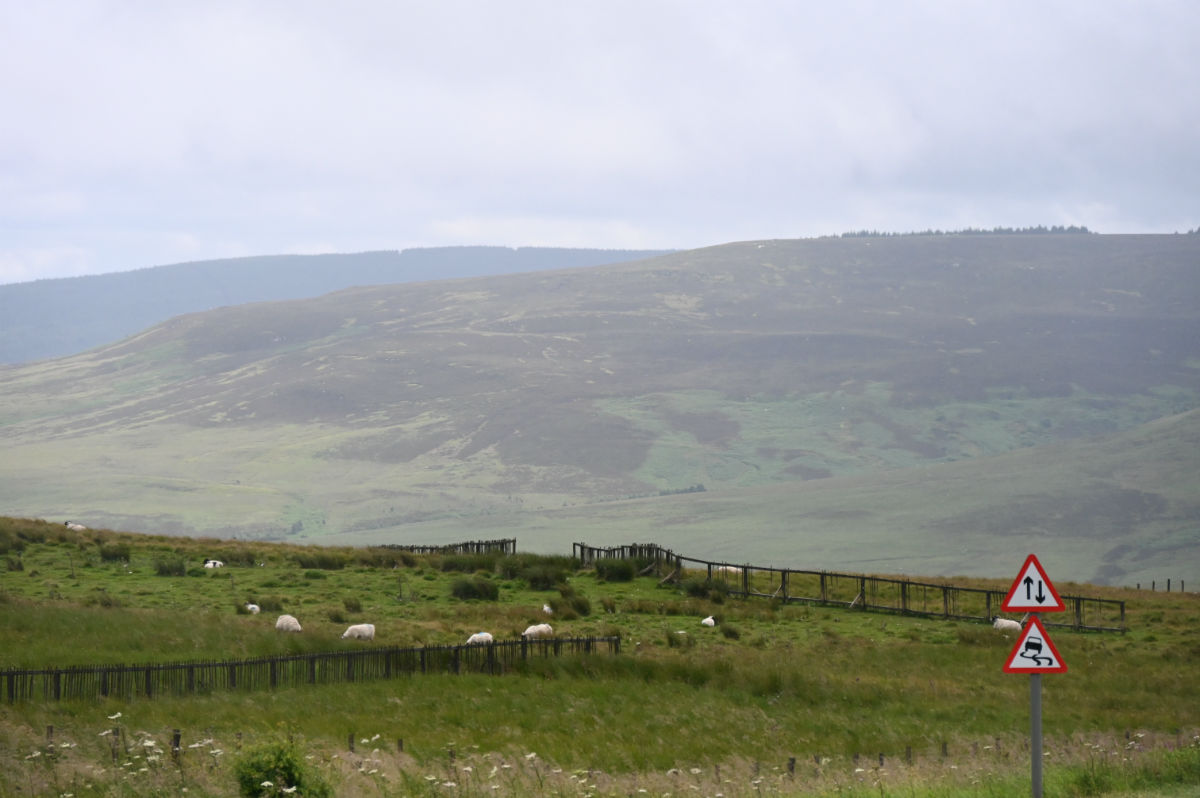
* “tupping” means bringing in a ram to (hopefully) impregnate the ewes
** A bolus contains slow release nutrients and vitamins, or, if necessary, medication. It’s a large pill or tablet for animals.
*** In some cases, taking sensible environmental measures doesn’t pay anything: This summer, Moore planted 2,000m of hedges. He is being reimbursed for the costs incurred, but that’s it.
**** Luing is a small island off the west coast of Scotland, the breed is extremely hardy and the cows know how to look after their calves even in foul, windy weather. David Stanners is a member of the Luing breeding society and finds the animals are doing well on higher pastures. And preparing two steaks upon our return home, we can attest to the excellent taste and texture of the meat.
More
Upland Farmers Face Harsh Realities in Post-Brexit England | Part 1
Post-Brexit Farm Policy – Where Do England’s Smallholdings and Horticulture Sector Stand?
Post-Brexit Farm Policy – Outlook Across Northern Ireland, Scotland and Wales




